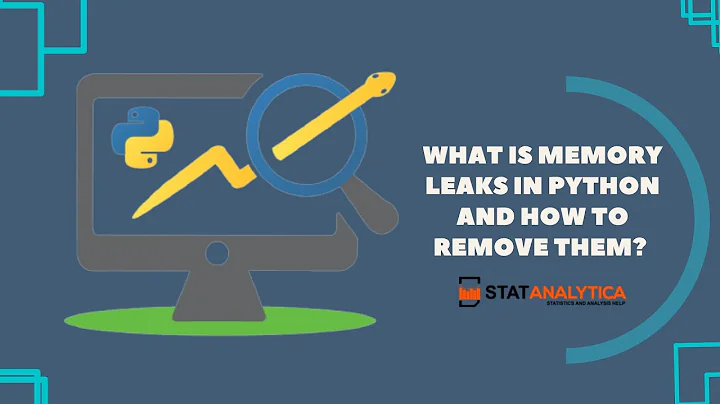Python: Memory leak debugging
Solution 1
See http://opensourcehacker.com/2008/03/07/debugging-django-memory-leak-with-trackrefs-and-guppy/ . Short answer: if you're running django but not in a web-request-based format, you need to manually run db.reset_queries() (and of course have DEBUG=False, as others have mentioned). Django automatically does reset_queries() after a web request, but in your format, that never happens.
Solution 2
Have you tried gc.set_debug() ?
You need to ask yourself simple questions:
- Am I using objects with
__del__methods? Do I absolutely, unequivocally, need them? - Can I get reference cycles in my code? Can't we break these circles before getting rid of the objects?
See, the main issue would be a cycle of objects containing __del__ methods:
import gc
class A(object):
def __del__(self):
print 'a deleted'
if hasattr(self, 'b'):
delattr(self, 'b')
class B(object):
def __init__(self, a):
self.a = a
def __del__(self):
print 'b deleted'
del self.a
def createcycle():
a = A()
b = B(a)
a.b = b
return a, b
gc.set_debug(gc.DEBUG_LEAK)
a, b = createcycle()
# remove references
del a, b
# prints:
## gc: uncollectable <A 0x...>
## gc: uncollectable <B 0x...>
## gc: uncollectable <dict 0x...>
## gc: uncollectable <dict 0x...>
gc.collect()
# to solve this we break explicitely the cycles:
a, b = createcycle()
del a.b
del a, b
# objects are removed correctly:
## a deleted
## b deleted
gc.collect()
I would really encourage you to flag objects / concepts that are cycling in your application and focus on their lifetime: when you don't need them anymore, do we have anything referencing it?
Even for cycles without __del__ methods, we can have an issue:
import gc
# class without destructor
class A(object): pass
def createcycle():
# a -> b -> c
# ^ |
# ^<--<--<--|
a = A()
b = A()
a.next = b
c = A()
b.next = c
c.next = a
return a, b, b
gc.set_debug(gc.DEBUG_LEAK)
a, b, c = createcycle()
# since we have no __del__ methods, gc is able to collect the cycle:
del a, b, c
# no panic message, everything is collectable:
##gc: collectable <A 0x...>
##gc: collectable <A 0x...>
##gc: collectable <dict 0x...>
##gc: collectable <A 0x...>
##gc: collectable <dict 0x...>
##gc: collectable <dict 0x...>
gc.collect()
a, b, c = createcycle()
# but as long as we keep an exterior ref to the cycle...:
seen = dict()
seen[a] = True
# delete the cycle
del a, b, c
# nothing is collected
gc.collect()
If you have to use "seen"-like dictionaries, or history, be careful that you keep only the actual data you need, and no external references to it.
I'm a bit disappointed now by set_debug, I wish it could be configured to output data somewhere else than to stderr, but hopefully that should change soon.
Solution 3
See this excellent blog post from Ned Batchelder on how they traced down real memory leak in HP's Tabblo. A classic and worth reading.
Solution 4
Do you use any extension? They are a wonderful place for memory leaks, and will not be tracked by python tools.
Solution 5
I think you should use different tools. Apparently, the statistics you got is only about GC objects (i.e. objects which may participate in cycles); most notably, it lacks strings.
I recommend to use Pympler; this should provide you with more detailed statistics.
Related videos on Youtube
Paul Tarjan
I'm a Distinguished Engineer at Robinhood. I used to be the Tech Lead of Developer Productivity at Stripe where I built Sorbet. Before that I was the CTO and cofounder at Trimian. Before that I was a Software Engineer at Facebook on HHVM and the Open Graph. Before that I was the Tech Lead for Yahoo! SearchMonkey. See my homepage for more.
Updated on July 09, 2022Comments
-
Paul Tarjan almost 2 years
I have a small multithreaded script running in django and over time its starts using more and more memory. Leaving it for a full day eats about 6GB of RAM and I start to swap.
Following http://www.lshift.net/blog/2008/11/14/tracing-python-memory-leaks I see this as the most common types (with only 800M of memory used):
(Pdb) objgraph.show_most_common_types(limit=20) dict 43065 tuple 28274 function 7335 list 6157 NavigableString 3479 instance 2454 cell 1256 weakref 974 wrapper_descriptor 836 builtin_function_or_method 766 type 742 getset_descriptor 562 module 423 method_descriptor 373 classobj 256 instancemethod 255 member_descriptor 218 property 185 Comment 183 __proxy__ 155which doesn't show anything weird. What should I do now to help debug the memory problems?
Update: Trying some things people are recommending. I ran the program overnight, and when I work up, 50% * 8G == 4G of RAM used.
(Pdb) from pympler import muppy (Pdb) muppy.print_summary() types | # objects | total size ========================================== | =========== | ============ unicode | 210997 | 97.64 MB list | 1547 | 88.29 MB dict | 41630 | 13.21 MB set | 50 | 8.02 MB str | 109360 | 7.11 MB tuple | 27898 | 2.29 MB code | 6907 | 1.16 MB type | 760 | 653.12 KB weakref | 1014 | 87.14 KB int | 3552 | 83.25 KB function (__wrapper__) | 702 | 82.27 KB wrapper_descriptor | 998 | 77.97 KB cell | 1357 | 74.21 KB <class 'pympler.asizeof.asizeof._Claskey | 1113 | 69.56 KB function (__init__) | 574 | 67.27 KBThat doesn't sum to 4G, nor really give me any big data structured to go fix. The unicode is from a set() of "done" nodes, and the list's look like just random
weakrefs.I didn't use guppy since it required a C extension and I didn't have root so it was going to be a pain to build.
None of the objectI was using have a
__del__method, and looking through the libraries, it doesn't look like django nor the python-mysqldb do either. Any other ideas?-
Paul Tarjan over 14 yearsIt is a cron job that imports the Django settgings.py and uses many of the Django ORM features. So, it isn't spawned by a webserver, but still uses many of the features (which might have been pertinent)
-
-
Paul Tarjan over 14 yearsgc.collect() is returning everything as collectible, and on the second invocation returns 0. That means I don't have any cycles right?
-
Paul Tarjan over 14 yearsNo extensions, but a good place for others stumbling here to look.
-
Nicolas Dumazet over 14 years@Paul: No, you can still have cycles. Look at the very last example I gave: here, gc.collect() does return 0, and nothing is printed. If you have cycles of objects that don't have del methods, gc will stay quiet.
-
zgoda over 14 yearsIf you use Django ORM, you use extension module - DB-API database driver. Is this MySQLdb? Current version has known cursor memory leak when connection is established with use_unicode=True (which is the case for Django>=1.0).
-
Paul Tarjan over 14 yearsyes, you are right on the money! I'm using all of those. Any known solution?
-
zgoda over 14 yearsTry with the code from SVN, the leak has been fixed but update has not been released yet.
-
endre almost 13 yearsdb.reset_queries() solved a problem for me, thank you very much.






